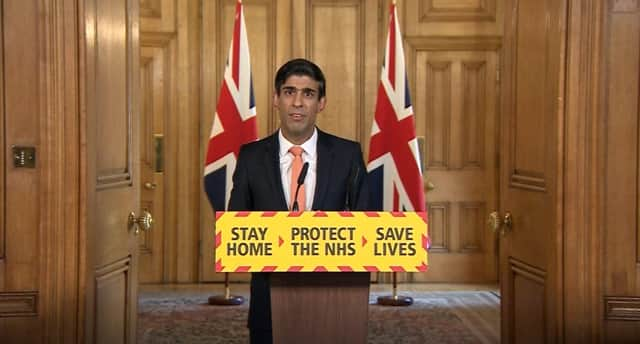This information vacuum has echoes of Lord Haw-Haw – David Behrens


It’s about the only thing you can take my word for, though. I’m living in the same vacuum as everyone else, and quite honestly I no longer know who or what to believe. Is the lockdown to be lifted in the foreseeable future? Might it be re-enforced later? And is the whole thing a plot by forces unseen? I have seen all three hypotheses advanced this week and none seems credible. But neither does anything else.
Three weeks after we were confined to quarters, we remain exactly where we started, with many questions and few answers.
Advertisement
Hide AdAdvertisement
Hide AdUnofficial channels like Facebook, on which any old Johnny Know-all can hold forth and be heard by millions, don’t help. Nick Clegg – the same one who was once an MP in Sheffield and is now Facebook’s vice president – insisted this week that the company would not be party to propagating false information. Specifically, he said, suggestions it had published that drinking bleach was an antidote to the virus (don’t try that at home) or that social distancing made no difference, would in future be banned.


But no sooner had he said it than a researcher had placed adverts on Facebook advocating both of those courses. Mr Clegg’s promise had been as effective as the one he made in 2010, about opposing an increase in university tuition fees.
There have been many parallels drawn between the present situation and the Second World War, the most poignant by far being the Queen’s perfectly pitched invocation of Dame Vera Lynn, last Sunday.
Advertisement
Hide AdAdvertisement
Hide AdThere are other analogies, too. Comedians like Paul Merton and the satirist Nish Kumar, who have returned to our screens in the last week, are trying to do for the nation’s morale what Tommy Handley and Arthur Askey did in the 1940s. And Ian Hislop is a latter-day Professor Joad from The Brains Trust. Now there’s a once-household name lost to the ages.
But the difficulty in separating truth from fiction brings to mind another wartime chapter, whose lessons we have so far failed to remember.
The mass communication medium of the time was radio which could, like Facebook, radiate information over a surprisingly great distance. During the phoney war which preceded the Battle of Britain, this facility was seized upon by the home-grown Fascist William Joyce, in treacherous broadcasts from Hamburg that were actively tuned into by nearly a third of British listeners.
Advertisement
Hide AdAdvertisement
Hide AdTheir appeal was exactly comparable to that of Facebook today. As the historian Asa Briggs remembered it, listeners, starved of information from the official channels, gravitated to Joyce to relieve the boredom of a war that was still being fought far away.
The content was eerily comparable, too: snippets of information that were socially subversive yet contained a certain ring of truth, said Briggs.
Neville Chamberlain’s government couldn’t silence Lord Haw-Haw, as the papers mockingly rechristened Joyce, so instead it encouraged a BBC drama in which the characters questioned whether anything he said could ever be taken seriously. “Some people are such asses that they believe everything they hear on the air,” cautioned one of them.
Advertisement
Hide AdAdvertisement
Hide AdThe information vacuum of that time was a breeding ground for the rumour monger, and the same is true now, but it needn’t be. Our leaders may not be able to deliver testing kits as quickly as we would like, but they could establish a better and more incontrovertible channel of communication than they have so far done.
William Joyce, of course, was openly malevolent; much of what is on Facebook is merely insidious. But that was bad enough during Brexit and it’s downright dangerous now. Misinformation is a virus in itself, and if Mr Clegg can’t or won’t stem the flow, the rest of us can take the lead by socially distancing ourselves from it.
That will be as difficult for some as heeding the official advice to stay at home on this sunny, holiday weekend, when they might otherwise have been setting pieces of moorland alight with their portable barbecues. But that is to be our lot this year. At least it’s Easter Day today, when the shops would have been closed anyway.
Editor’s note: first and foremost - and rarely have I written down these words with more sincerity - I hope this finds you well.
Advertisement
Hide AdAdvertisement
Hide AdAlmost certainly you are here because you value the quality and the integrity of the journalism produced by The Yorkshire Post’s journalists - almost all of which live alongside you in Yorkshire, spending the wages they earn with Yorkshire businesses - who last year took this title to the industry watchdog’s Most Trusted Newspaper in Britain accolade.
And that is why I must make an urgent request of you: as advertising revenue declines, your support becomes evermore crucial to the maintenance of the journalistic standards expected of The Yorkshire Post. If you can, safely, please buy a paper or take up a subscription. We want to continue to make you proud of Yorkshire’s National Newspaper but we are going to need your help.
Postal subscription copies can be ordered by calling 0330 4030066 or by emailing [email protected]. Vouchers, to be exchanged at retail sales outlets - our newsagents need you, too - can be subscribed to by contacting subscriptions on 0330 1235950 or by visiting www.localsubsplus.co.uk where you should select The Yorkshire Post from the list of titles available.
If you want to help right now, download our tablet app from the App / Play Stores. Every contribution you make helps to provide this county with the best regional journalism in the country.
Sincerely. Thank you.
James Mitchinson, Editor
Comment Guidelines
National World encourages reader discussion on our stories. User feedback, insights and back-and-forth exchanges add a rich layer of context to reporting. Please review our Community Guidelines before commenting.